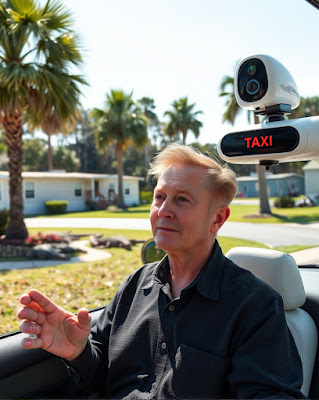I think we're mostly in agreement that a driverless cab system such as Tesla's, would be a no brainer in a managed environment, say a theme park. We're in people mover territory, sans rails, because wireless provides the rails. We also potentially don't need all the redundantly duplicated lidar, because the system knows where all the cabs are. It's just a matter of that bouncing ball some tourist lost, or tossed.
Regarding the RoboVan or whatever we call it, and the fantasy of no windows: I'd say the fantasy there is to republish the outside windows vista via camera and adding layers of info ala tour guide in Rome. I don't know if this'd work nor to what extent it's lab tested. I'm not the geek in charge. I'm just speculating based on what comes my way from the demo shots.
The unveiling of Tesla RoboCab and RoboVan concept cars was in the context of a constructed studio environment, a made-for-TV town. That's what I'm thinking too: a TV town turned into a livable 24/7 town. But we'd have spectators from the beginning. You don't build an OMR "under cover".
Any substantial construction needs breathing room, which means partial discovery. Hard secrecy is a strategic burden. When you make a film, the locals know. Later, when they see it on the big screen, they remember, with some locals maybe joining the cast (or comprising it).
When I say theme park, I mean highly managed and engineered, a planned community. Florida has a lot of those, consisting of boxy prototype units, replaceable in case of hurricane, each with an allotted slot in a grassy park, perhaps with golf links.
Golf Lakes Estates is a good example, in Bradenton. I used to live there. No complaints. Not a bad lifestyle for this cohort of retirees. My grandparents invested money saved, by not buying a "real house" (hand-me-down monster), on trips to Europe, which, as a stylish trend, helped heal some of the war wounds and boosted the German car industry.
The challenge to the driverless car vision has always been: actual drivers. Positing autonomy to every vehicle, versus centrally routing, is the expensive step. Or am I wrong? The only way to conquer an existing city, a Cincinnati, in the hybrid model (driven and driverless), is to make the robotic system intelligently aware of what the "uncontrollables" are doing, and that's what you don't want.
Vehicles in a mobile home park are by definition slow moving. We don't need any robocab Ferraris unless we devote dedicated lanes, entire freeways, to automation. That could happen along some routes. The most common fallacy is either/or is it not? So often we're presented with the false dichotomy. It's either everywhere or nowhere. Really? Not always.
So why doesn't Florida already have robocab oases? Why is the future on that score always around the corner? Doesn't even a single golf course offer automated golf carts, just for grins? Perhaps golfers would feel insulted? Is there something about golfer culture that means you can't press a button for which hole you want, and the cart takes you there?
How about a zoo then? How do we mix with pedestrians? How do we do that at airports, with their long concourses and beeping vehicles transporting the elderly and disabled, or tired kids? They have human drivers.
So how about we segregate the two streams? Paths for humans and vehicles. But isn't the whole point of a taxi that you can wave one down? True, but we still have streets vs sidewalks. We've already learned to segregate from traffic. The humans are already trained on that score.

